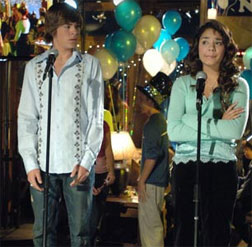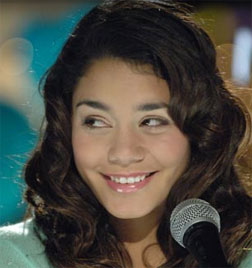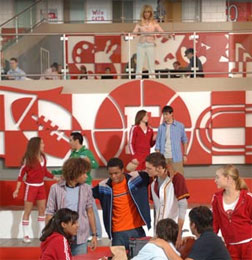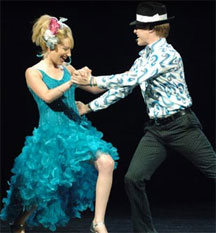High School Musical: a review
28.03.06
 High School Musical, A Modern Disney Channel Phenomenon
High School Musical, A Modern Disney Channel Phenomenon
“We’re All In This Together”
As I write this the Billboard Top 100 groans under the weight of the soundtrack LP to an obscure movie of the week that debuted back in January on the Disney Channel called High School Musical. It’s like they couldn’t even think of a real title, instead resorting to the generic. Like a can of beans labeled “Beans.” This is the little LP that could; in contrast to the debuts of new releases by oh, Kanye or Usher, which leap into the top position first week out, then drop from there, the High School Musical soundtrack crept humbly up the charts, debuting at something like #250 first week out and then rising like a helium balloon. This, my friends, is true word of mouth, backed by a sort of marketing muscle Disney hasn’t exercised in a while. I was curious about how wretched a movie it might be, but never thought I’d have the actual balls to watch it! However the other night I managed to catch the darn show. How did this unsung little production manage to captivate most of what’s left of the record buying public? (It’s the #1 best seller on Amazon.)
My short answer—I don’t know! But, it’s great and here’s why! Troy Bolton, the captain of the East High Wildcats (in a suburb of Albuquerque), is the son of the basketball coach, himself once the team captain way back in 1981. To the adoring crowd at school, Troy’s “that basketball guy.” His opposite number is new in town, Gabriella Montez. Before she moved here she was known at her old school as a math geek, an identity she hated, and for good reason since in looks and personality she’s like Jennifer Lopez as a sixteen-year-old girl. Va-va-voom! You remember how Lindsay in Freaks and Geeks had that love-hate relationship with the Math Decathlon? Gabriella’s got the same thing going on here in spades. At a karaoke party Troy and Gabriella discover a common passion for singing, and through the power of movie coincidence they find themselves in the same East High home room, and strangely are drawn to a mawkish poster in the school hallways, urging them to sign up for auditions for “Twinkletown,” the winter musical. The movie starts getting interesting right about here, since Troy’s teammates laugh at him for wanting to audition for the show, but they don’t say why. They can’t, I suppose, for the movie has to stay G-rated because it was made by Disney. It’s been so long since I saw a G rated anything that its conventions simply astound me; it’s like wandering into a new funhouse of art—definitely a new drug, like Ecstasy, that just makes you giggle with the sheer power of the inane. The Wildcats aren’t scorning the drama club for being gay; instead they object to show music as not being hip-hop enough. That said, the entire Wildcats squad, plus extra guys whose jobs involve clipboards and buckets of Gatorade, break into a strenuous dance right on the court, extradiagetically revealing, they’re all in a musical anyhow whether or not they realize it. A basketball dance no less, with thumping sneakers and the high-pitched theremin-like sound a basketball makes while whipping round the rim of the hoop. This number, “Get Cha Head in the Game,” has some rap influence I suppose, as does Shostakovich if listened to with open ears. It’s so ludicrous I nearly turned off the TV right then and there. Indeed, I nearly sold the TV for spare change.
 However there is something awfully appealing about Troy (played by newcomer Zac Efron). “He has pretty eyes,” (Kevin’s wife) Dodie said, critically. “And he’s cute now but he’s not going to age well.” We debated whether or not that made his current beauty more real or more illusory. He looks good in a basketball uniform: the Wildcats’ creamy satin with the scarlet trim, the red squares on his thighs, the stalwart number (14) low on his stomach, right above his third chakra, his tan t’ien—the chi center where he stores all his red energy. I think at this point you’ll be, like, OK, turn the TV back on, maybe he’ll get more interesting or at any rate take a shower, look at him, his blond tousled hair is absolutely wet with exhilarated sweat. I recognized him from playing the child version of “Simon” when, on Joss Whedon’s Firefly, one episode flashed back to the traumatic childhood shared by Simon and River. Well anyhow, now he’s Troy.
However there is something awfully appealing about Troy (played by newcomer Zac Efron). “He has pretty eyes,” (Kevin’s wife) Dodie said, critically. “And he’s cute now but he’s not going to age well.” We debated whether or not that made his current beauty more real or more illusory. He looks good in a basketball uniform: the Wildcats’ creamy satin with the scarlet trim, the red squares on his thighs, the stalwart number (14) low on his stomach, right above his third chakra, his tan t’ien—the chi center where he stores all his red energy. I think at this point you’ll be, like, OK, turn the TV back on, maybe he’ll get more interesting or at any rate take a shower, look at him, his blond tousled hair is absolutely wet with exhilarated sweat. I recognized him from playing the child version of “Simon” when, on Joss Whedon’s Firefly, one episode flashed back to the traumatic childhood shared by Simon and River. Well anyhow, now he’s Troy.
When Troy and Gabriella egg each other on to take part in the auditions (Troy smuggles himself backstage behind a mop on the janitor’s cart—adorable), this news comes as a shock to the school’s Dramatic Club, for apparently the drama regulars have had no competition for aeons. One of the movie’s themes is that, although youth is thought to be a time of experiment, it is actually filled with people desperate for a niche who will occupy one even when it doesn’t quite fit. Ryan and Sharpay Evans in particular are outraged. This brother-sister team has played the lead parts in East High’s last 17 musicals! Yes, 17! I could write a whole article about Ryan and Sharpay, but I don’t have the space to do them justice. Just Google an image of the two of them, waiting in the wings, evil in their hearts, planning their next curtain call and the demise of Troy and Gabriella. Sharpay sports blond extensions and dresses like Britney Spears in the video for “Everytime.” She’s loud, crass and full of herself—old school egomaniac. Her withering putdowns of everyone around her have that insouciant Sarah Silverman touch—G rated of course. In a way, Sharpay’s machinations reveal a misplaced loyalty to East High. As she explains, “We need to save our show from people who don’t know the difference between a Tony Award—and Tony Hawk.” What? It’s a little bit off, how I can’t say —I suppose by talking about Tony Hawk (the pro skateboarder) as though Sharpay, herself remarkably insular, would know anything about him. Tony Hawk’s nearly 40, she might as well have said, “Tony Orlando” or “Tony Bennett.” How about Tony Soprano?
Even her own brother can’t take Sharpay, and he’s weirder than she is! The actor who plays Ryan, Lucas Gabreel, deserves whatever they’re paying him and more, simply for the way he allows the scriptwriters and director to make him into the biggest queen bitch ever portrayed in the movies. He’s like a young, languid, Clifton Webb in striped pants in earth tones and oversized caps with suede accents that match his dress shirts. Ryan’s lashes are so albino pale they seem to disappear into his skin, giving him a permanent look of insincerity, his eyes bulging in disbelief. When he hears he has competition, he decides it’s a cosmic joke, or that he’s on Candid Camera—it’s a trap of his masculinity. “Maybe we’re being ‘Punk’d’ right now!” Then, looking on the bright side, he reasonably enough inquires if he’s going to get to meet Ashton Kutcher.
 As I hope I’ve shown, Ryan’s no brainiac. In one sequence, the Wildcats stand on locker benches while one by one they rip off their jackets to reveal letters on their chests: they spell out the words, “Go Drama Club” (Troy plays the exclamation point, in a winning display of phallocentricity.) Everyone’s either tickled, horrified or titillated, except for Ryan, who can’t make the individual characters coalesce into words. With knitted, invisible brows, he spells out, “G-O-D? GODRA? GODRAM?” Though the movie seems determined never to mention the word “gay” in any shape or form, Lucas Gabreel’s portrayal of Ryan Evans will live forever in gay iconography; if you’ve ever seen Flaming Creatures by Jack Smith—or possibly Fellini Satyricon—you have glimpsed from afar his staggering implausibility. Now come see it closeup, along with one million gay 7th and 8th graders who now have someone to emulate. Ryan’s outfits are maybe one or two sizes too small, so that he seems to bulge in unseemly places all over. I think of that as the intellectual look. You know who has it, that kind of stuffed sausage sexiness? Slavoj Zizek of course. I could eat them both with a spoon.
As I hope I’ve shown, Ryan’s no brainiac. In one sequence, the Wildcats stand on locker benches while one by one they rip off their jackets to reveal letters on their chests: they spell out the words, “Go Drama Club” (Troy plays the exclamation point, in a winning display of phallocentricity.) Everyone’s either tickled, horrified or titillated, except for Ryan, who can’t make the individual characters coalesce into words. With knitted, invisible brows, he spells out, “G-O-D? GODRA? GODRAM?” Though the movie seems determined never to mention the word “gay” in any shape or form, Lucas Gabreel’s portrayal of Ryan Evans will live forever in gay iconography; if you’ve ever seen Flaming Creatures by Jack Smith—or possibly Fellini Satyricon—you have glimpsed from afar his staggering implausibility. Now come see it closeup, along with one million gay 7th and 8th graders who now have someone to emulate. Ryan’s outfits are maybe one or two sizes too small, so that he seems to bulge in unseemly places all over. I think of that as the intellectual look. You know who has it, that kind of stuffed sausage sexiness? Slavoj Zizek of course. I could eat them both with a spoon.
I wish I were Ethan Mordden with his encyclopedic knowledge of theater conventions but even I know a bit about the history of the musical. While High School Musical apes everything from Babes in Arms to Grease and West Side Story and Fame, it might be most profitably studied in the context of the troubled line of musicals made for TV. Television musicals—it’s almost a contradiction in terms. Perhaps the best known is Cinderella, by Rodgers and Hammerstein, aired live with Julie Andrews in spring 1957, and since its first broadcast was restaged twice more, most recently with Brandy and Whitney Houston (as the Fairy Godmother). Cole Porter wrote his last complete score, “Aladdin” (1958) as a TV vehicle for Sal Mineo:
If you want to buy a kite
Or a pup to keep you up at night
Or a dwarf who used to know Snow White
Or a frog who loves to sing,
Come to the supermarket in old Peking.
 Lots of the old-time musical specialists composed for the tube: Dietz and Schwartz, Bock and Harnick, Dorothy Fields and Burton Lane. Stephen Sondheim wrote the creepy “Evening Primrose” for a 1966 ABC variety show; in it Anthony Perkins haunted a luxury department store, making out with the mannequins after dark:
Lots of the old-time musical specialists composed for the tube: Dietz and Schwartz, Bock and Harnick, Dorothy Fields and Burton Lane. Stephen Sondheim wrote the creepy “Evening Primrose” for a 1966 ABC variety show; in it Anthony Perkins haunted a luxury department store, making out with the mannequins after dark:
I remember leaves
Green as spearmint
Crisp as paper.
I remember trees
Bare as coat racks
Spread like broken umbrellas.
Burt Bacharach wrote a TV musical—“On the Flip Side,” a proto-rock opera for Rick Nelson (also 1966). Even the Beatles’ Magical Mystery Tour was originally written for BBC-TV, where it premiered at Christmas 1967. In contrast, the score to High School Musical isn’t technically unified — it’s written by a whole team of collaborators — but it’s a patchwork of echoes and pentimenti, a loving salute to past glories. Everything in it has been sung before, though the youngsters who play in this harlequinade have an energy that’s contagious. By the time the crisis arrives—Twinkletown’s auditions are rigged to fall on the exact same afternoon as Gabriella’s epochal Math Tournament and Troy’s championship contest against the West High Knights—you’re pretty much won over.
There’s a school hallway number for a brokenhearted Gabriella to sing, called, “When There Was Me and You.” The young actress isn’t that great at diction, but the way she slouches against the lockers and poses on the banisters, she is paying secret homage to Stockard Channing who, at age 42, played the pregnant Rizzo in Grease and delivered one of the great torch numbers of the modern musical: “There are Worse Things I Could Do.” While Gabriella doesn’t have the chops or pipes of Rizzo, something of Rizzo’s mature (indeed MILF) sexuality pours through screen history and infects her with a warm, smoky longing.
 The school drama teacher, Ms. Darvas, is played in a whirlwind of high dudgeon by old-time Broadway stalwart Alyson Reed. Reed is done up in stylish blonde tresses that sweep up the sides of her head as though afraid to face her in person. Her huge sunglasses, colorful scarves, and theatrical pantsuits made me wonder if the producers had ever been to a reading by the Bolinas poet Joanne Kyger, for Ms. Darvas seems like sort of a non-Buddhist Kyger, with the star power and the vision thing intact, plus a Russian hauteur like a wolfhound that Kyger thankfully lacks. Alyson Reed! Surely the moviemakers wanted us to flash back 20 years to the days of movie musical hell, the period in which there hadn’t been a successful film musical in many years, and someone thought of doing A Chorus Line in 1985 with Michael Douglas, directed by Sir Richard (Gandhi) Attenborough, exactly the right man for the part! Anyhow poor Alyson Reed wound up in the star part of Cassie, the older dancer who’s been around a bit and whose last shot at stardom this is, the woman who sings “What I Did for Love” and dances her own life in front of a giant spectral looking glass in “The Magic and the Mirror.” Alyson Reed! I can’t believe she’s still alive, not after dying a thousand deaths in the Chorus Line movie! Casting her is like casting the albatross from the Ancient Mariner movie! Some performers bring with them their own legend, while Reed instead drags failure and misery into any project she’s attached to. Well more power to her! In general we need a movie that dares to flaunt its own low budget and flirtation with disaster. And now at last the curse is broken!
The school drama teacher, Ms. Darvas, is played in a whirlwind of high dudgeon by old-time Broadway stalwart Alyson Reed. Reed is done up in stylish blonde tresses that sweep up the sides of her head as though afraid to face her in person. Her huge sunglasses, colorful scarves, and theatrical pantsuits made me wonder if the producers had ever been to a reading by the Bolinas poet Joanne Kyger, for Ms. Darvas seems like sort of a non-Buddhist Kyger, with the star power and the vision thing intact, plus a Russian hauteur like a wolfhound that Kyger thankfully lacks. Alyson Reed! Surely the moviemakers wanted us to flash back 20 years to the days of movie musical hell, the period in which there hadn’t been a successful film musical in many years, and someone thought of doing A Chorus Line in 1985 with Michael Douglas, directed by Sir Richard (Gandhi) Attenborough, exactly the right man for the part! Anyhow poor Alyson Reed wound up in the star part of Cassie, the older dancer who’s been around a bit and whose last shot at stardom this is, the woman who sings “What I Did for Love” and dances her own life in front of a giant spectral looking glass in “The Magic and the Mirror.” Alyson Reed! I can’t believe she’s still alive, not after dying a thousand deaths in the Chorus Line movie! Casting her is like casting the albatross from the Ancient Mariner movie! Some performers bring with them their own legend, while Reed instead drags failure and misery into any project she’s attached to. Well more power to her! In general we need a movie that dares to flaunt its own low budget and flirtation with disaster. And now at last the curse is broken!
I remember seeing her onstage as Sally Bowles in Cabaret, when she was still youngish, before the Chorus Line fiasco, and then I spotted her in the Bank of America on Powell street, back in the days when people still went into banks to cash checks. (Does anybody remember this?) For a moment I hesitated. Was it really her? I couldn’t decide, up so close, without stage makeup. My eyes strayed to her hands and when I saw that signature green nail polish I knew it was her, and I cast discretion aside and screamed that I was her biggest fan in all of San Francisco and I absolutely loved her work and could she sign—well, what could she sign? In a flash of inspiration I produced my bankbook, which very pleasantly she signed “with love.” Do people have bankbooks any more? Hope I still have that old one. Seems like I always had it in my pocket at all hours back then. With that same bankbook I nabbed the autographs of Albert Finney and Chrissie Hynde—I’d see them, then I’d surround them, then I’d swallow them whole.
 I won’t explain the third act triumphs that allow the math geeks to cut out of the tournament and the Wildcats to leave the championship in time to ace the last round of auditions. Troy’s still wearing his uniform, and Gabriella this ultra-scientific white lab coat when they launch into “Breaking Free.” It’s a sinuous, sex number in which the two non-dancing stars walk around each other repeatedly, circling like coupling animals. Gabriella strips off her lab coat to reveal an ordinary blouse and skirt combination, but the crowd goes wild, cheering loud enough to raise the roof. Poor Sharpay and Ryan see their dreams of an 18th musical triumph wither and die. Their open mouths like two birdhouses, forever stuck in “O”s of regret and shock.
I won’t explain the third act triumphs that allow the math geeks to cut out of the tournament and the Wildcats to leave the championship in time to ace the last round of auditions. Troy’s still wearing his uniform, and Gabriella this ultra-scientific white lab coat when they launch into “Breaking Free.” It’s a sinuous, sex number in which the two non-dancing stars walk around each other repeatedly, circling like coupling animals. Gabriella strips off her lab coat to reveal an ordinary blouse and skirt combination, but the crowd goes wild, cheering loud enough to raise the roof. Poor Sharpay and Ryan see their dreams of an 18th musical triumph wither and die. Their open mouths like two birdhouses, forever stuck in “O”s of regret and shock.
Sharpay and Ryan Evans are a gay, incestuous couple, Dodie says. And the harsh logic of the plot says they have to be unseated to make room for the return of bourgeois heteronormativity. Yes, I said, I do agree, but your “gay incestuous couple” reinforces a frighteningly all-white hegemony—they’re so blonde they look like Siegmund and Sieglinde from Die Walküre – whereas as Troy and Gabriella triumph, their interracial coupling threatening white supremacy. We couldn’t work this one out, particularly when (spoilers ahead) both Ryan and Sharpay wind up erotically entangled with Zeke, the black basketball player whose secret passion is cooking crème brulee. Is it a good thing or a bad thing or neither? Chad Danforth, the black (or mixed race) boy who’s Troy’s best friend, is played by an actor called “Corbin Bleu.” Doesn’t that sound like Cordon Bleu? He’s the one who should have been secretly baking crème brulee!
Comeback to the year award goes to director/choreographer Kenny Ortega. People talk about the Busby Berkeleys and Bob Fosses of the past, the great movie choreographers, but for some reason they totally snub Kenny Ortega, who has been working under a cloud for the past 15 years. Once he was the top of the heap, having done the numbers not only for Dirty Dancing but the magnificently mad Xanadu with Olivia Newton-John on roller skates! The Xanadu credit alone should insure that Ortega’s name would go down in dance history for 10,000 years, and plus he also staged the prom number in Pretty in Pink and the “Twist and Shout” street parade in Ferris Bueller! However, the perceived flop of Newsies, at the time the most expensive musical flop of all time, made his name mud in Hollywood. And then the very next year he killed Bette Midler’s career altogether by directing her in Hocus Pocus – do you remember? the movie in which she was supposed to be an evil witch? Three crone sisters—Midler, Kathy Najimy, and the truly witchlike Sarah Jessica Parker? Oh, how awful. Oh, what a horrid experience. It was like taking oxygen out of the theater. You walked in and in a minute you felt deflated, your bones irradiating bad heat. Like a wounded badger, Kenny Ortega slunk away, licked his wounds for 13 years and kept himself busy directing episodes of crummy TV shows, and planned his return. Who knew that High School Musical would be it? Now he’s in the position of picking and choosing his dream projects. Or will he just sell out and do High School Musical II?
Listen, what’s that sound? It’s Kenny Ortega muttering "it should have been me directing Rent for the big screen, Rent and Chicago."